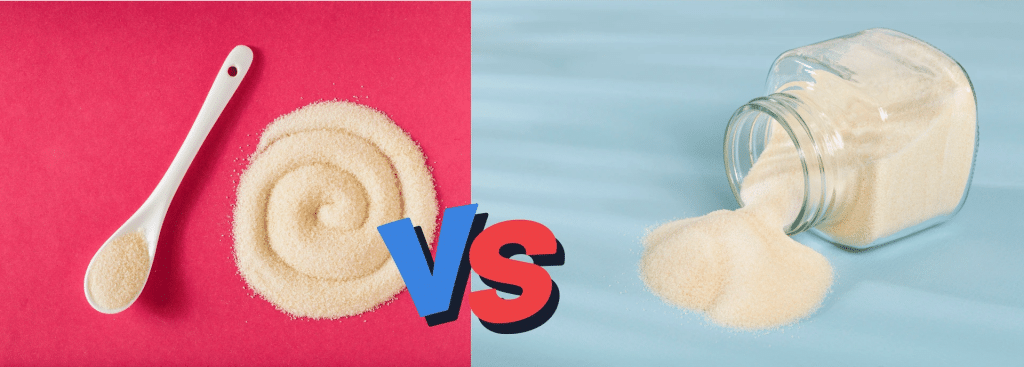
Are you a fan of collagen peptides but secretly worried they might be sabotaging your weight goals? It’s a common question in the wellness world: “Does collagen peptides cause weight gain?” Given its status as a protein supplement, it’s natural to wonder if adding it to your routine will lead to unwanted pounds. This article dives deep into the science to separate fact from fiction. We’ll explore how collagen affects your metabolism, its role in satiety, and whether this popular supplement truly has an impact on the number on the scale. Get ready to get the definitive answer so you can confidently integrate collagen into your wellness journey without the guesswork.
What is collagen peptide?
Collagen peptides are the superstar of the wellness world, but their name can sometimes be a bit confusing. In simple terms, they are a broken-down, highly digestible form of collagen.
Think of it this way: The collagen protein that your body naturally produces is a massive, complex molecule—too large for your body to absorb efficiently from a supplement. Through a process called hydrolysis, this large protein is broken down into much smaller, more manageable pieces known as “peptides.”
These collagen peptides are also referred to as “hydrolyzed collagen” or “collagen hydrolysate.” Because of their small size, they are highly “bioavailable,” meaning your body can absorb and utilize them quickly. Once ingested, these peptides travel through your bloodstream to signal your body to produce more of its own collagen.
Essentially, collagen peptides are the most effective way to supplement the body’s declining collagen production, making them a popular choice for supporting skin elasticity, joint health, and strong hair and nails. They are typically sourced from animals, such as bovine (beef) or marine (fish) sources, and come in a convenient powder form that dissolves easily into hot or cold liquids.
can collagen peptides cause weight gain?
This is a frequent and valid question for anyone mindful of their health and weight. The short and reassuring answer is: no, collagen peptides are highly unlikely to cause weight gain on their own. In fact, they are often associated with supporting healthy weight management.
The misconception that collagen causes weight gain often stems from the fact that it is a protein supplement, and some people associate all protein supplements with “bulking up.” However, the science behind how collagen interacts with your body tells a different story.
Understanding Collagen and Calories
Weight gain is fundamentally a matter of a caloric surplus—consuming more calories than your body burns. A typical serving of collagen peptides contains a very low number of calories, usually between 30 and 70, with virtually no sugar or fat. To put this in perspective, this is far fewer calories than a small apple. Adding this to your daily routine without changing the rest of your diet is unlikely to create the caloric surplus needed for weight gain.
How Collagen Can Support Your Weight Goals
Rather than leading to weight gain, collagen can actually be a beneficial tool in a healthy weight management strategy for a few key reasons:
- Promotes Satiety: As a protein source, collagen helps you feel full and satisfied for longer. This can reduce the urge to snack between meals and help you consume fewer calories overall.
- Supports Metabolism: Protein has a higher thermic effect than carbohydrates or fats, meaning your body burns more calories to digest it. While not a dramatic increase, this small metabolic boost can contribute to your overall energy expenditure.
- Aids Lean Muscle Mass: While not a complete protein for muscle building like whey, the amino acids in collagen still support the health of your connective tissues, which are vital for a strong, active body. An active body with healthy muscle mass burns more calories at rest.
The Only Caveat: Mind the Additives
The only scenario where collagen might contribute to weight gain is if you are using a product that contains added sugars, artificial sweeteners, or high-calorie fillers. To avoid this, always choose a high-quality, pure collagen peptide supplement with minimal ingredients.

Can Taking Collagen Peptides Make You Stronger?
This is a key question for anyone focused on athletic performance and building strength. While collagen peptides aren’t a direct muscle-building powerhouse like whey protein, the answer to whether they can make you stronger is an emphatic yes—but not in the way you might think. Collagen’s power lies in its ability to fortify the foundation of strength, which is a critical area within sports nutrition.
How Collagen Contributes to Strength
Strength isn’t just about big muscles; it’s about the entire musculoskeletal system working together seamlessly. Collagen is the most crucial dietary supplement ingredient for building and maintaining the connective tissues that support this system.
- Tendon and Ligament Integrity: Collagen is the primary component of your tendons and ligaments. By supplementing with collagen peptides, you provide your body with the specific amino acids needed to strengthen these tissues. Stronger tendons and ligaments mean greater resilience against injury, allowing you to train harder and more consistently—a non-negotiable for strength gains.
- Enhanced Joint Function: As a key component of cartilage, collagen helps improve joint comfort and mobility. When your joints are well-supported and pain-free, you can perform exercises with proper form and greater range of motion, which is essential for maximizing muscle activation and strength.
- Supporting Muscle Mass: While not a complete protein, studies have shown that collagen, when combined with resistance training, can help increase fat-free mass and muscle strength, particularly in older adults. It works synergistically with other proteins in your diet to support the repair and growth processes triggered by exercise.
How to Choose a Collagen Peptide Supplement?
1. Prioritize Purity and Third-Party Testing
This is the most critical factor. The supplement industry is not strictly regulated, so it is essential to look for proof of a product’s purity. A reputable brand will have its supplements independently tested by a third party to verify their contents and check for contaminants like heavy metals, pesticides, and other toxins.
- Look for Certifications: Check the label for seals from trusted third-party organizations like NSF International, USP (United States Pharmacopeia), or Informed-Sport. These certifications confirm that what’s on the label is what’s in the bottle and that the product is free from harmful substances.
2. Understand the Source
Collagen supplements come from various animal sources, and the choice often comes down to personal preference or specific health goals.
- Bovine Collagen: Sourced from cowhide, this is the most common and cost-effective type. It is rich in Type I and Type III collagen, making it excellent for supporting skin, bone, and joint health.
- Marine Collagen: Sourced from fish skin and scales, this type is particularly rich in Type I collagen. It is often promoted for its superior benefits for skin health, including hydration and elasticity. It is a good option for pescatarians.
- Chicken Collagen: Sourced from chicken cartilage, this type is a good source of Type II collagen, which is the primary component of cartilage and is often recommended for joint and cartilage support.
3. Choose the Right Form: Hydrolyzed Collagen Peptides
For a supplement to be effective, your body needs to be able to absorb it. Hydrolyzed collagen, or collagen peptides, is the most bioavailable form.
- What it is: The hydrolysis process breaks down the large collagen protein molecule into small, easily digestible amino acid fragments (peptides).
- Why it matters: This small molecular size allows for rapid absorption into the bloodstream, where it can be efficiently delivered to the skin, joints, and bones.
4. Check the Ingredient List
A good collagen supplement should have a simple and transparent ingredient list.
- Avoid Unnecessary Additives: Steer clear of products with high amounts of added sugars, artificial sweeteners, flavors, or fillers. These can negate the health benefits and add unnecessary calories.
- Look for Transparency: A brand that lists the amino acid profile and the specific collagen type on the label is a good sign of quality and transparency.
Summary: The Takeaway
When choosing a collagen peptide supplement, prioritize a brand that provides third-party testing and clearly states the source. Opt for a product that is hydrolyzed for maximum absorption, and always choose a formula with minimal ingredients. Taking these steps will ensure you are investing in a safe and effective supplement that truly supports your health and wellness goals.
conclusion:does collagen peptides cause weight gain?
Based on the professional and scientific consensus, collagen peptides do not cause weight gain. As a low-calorie protein source, collagen actually supports weight management by promoting satiety, which can help you feel fuller for longer and reduce overall calorie intake. The only way collagen might be associated with weight gain is if it’s added to a high-calorie diet without adjustments or if the supplement itself contains added sugars and fillers. When used as a pure, high-quality supplement as part of a balanced diet, collagen is a beneficial tool for your health and weight goals, not an obstacle.
what is the difference between collagen and collagen peptides?
| Feature | Collagen (Native/Intact) | Collagen Peptides (Hydrolyzed) |
| Molecular Structure | Large, intact triple helix protein. | Small, broken-down protein fragments called peptides. |
| Molecular Weight | High molecular weight (>300 kDa). | Low molecular weight (<10 kDa), typically 2-6 kDa for optimal absorption. |
| Digestion Process | Requires significant enzymatic breakdown in the digestive tract. Often difficult for the body to fully process. | Pre-digested, requiring minimal breakdown. Ready for immediate absorption. |
| Bioavailability & Absorption | Very low. The large molecular size makes it difficult to pass through the intestinal wall and enter the bloodstream. | High. The small size allows for rapid and efficient absorption into the bloodstream, reaching target tissues. |
| Solubility | Insoluble in cold water. Creates a gel-like consistency in hot water (e.g., gelatin). | Highly soluble in both hot and cold liquids without gelling. |
| Function in the Body | Acts as a structural protein within tissues (e.g., skin, bones, cartilage). It is the finished product, not a raw material for synthesis. | Acts as building blocks and signaling molecules. Stimulates the body’s own collagen production. |
| Typical Applications | Found naturally in the connective tissues of animals. Used in cooking as gelatin (e.g., Jello, bone broth). | Used as a dietary supplement ingredient in powders, capsules, bars, and functional beverages. |
| Physical Properties | Forms a solid or gel when cooled. | Stays in a liquid solution; does not thicken or form a gel. |
Neither collagen nor its hydrolyzed form, collagen peptides, are known to directly cause weight gain. Both are pure protein sources, and a typical serving contains a low number of calories with no fat or carbohydrates. In fact, due to protein’s ability to increase satiety and support a healthy metabolism, supplementing with collagen can actually aid in weight management by helping you feel fuller for longer.
FAQs
Why have I gained weight after taking collagen?
Collagen itself is low in calories. Weight gain is caused by a caloric surplus. Check if you’re adding it to high-calorie drinks or if the product contains hidden sugars.
Does collagen help with belly fat?
Collagen does not specifically target belly fat. Weight loss and fat reduction require a caloric deficit through diet and exercise.
Are there any side effects to taking collagen?
Side effects are rare but can include mild digestive issues like bloating or stomach upset.
Is collagen peptides better than protein powder?
They serve different purposes. Collagen is best for joint, skin, and hair health, while traditional protein powder (like whey) is better for muscle building.
What drink is high in collagen?
Bone broth is a natural drink that is high in collagen.
Are collagen peptides worth it?
hey can be worth it if your goals are to support skin, hair, nail, or joint health.



